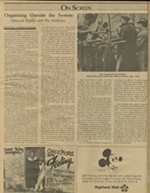("Video Reviews" wishes to thank Encore Movies & Music, I Luv Video, Vulcan Video, and Waterloo Video for their help in providing videos, laser discs, and DVDs.)
Desert Island Films, Part II In last week's issue, I listed my "Desert Island Top 10" videos and reviewed one of the selections, The Godfather trilogy. This time out, I look at three more -- Preston Sturges' Palm Beach Story (and check out Robert Faires' superb article, "Fast, Cheap, & Out of Control," about the Austin Film Society's Preston Sturges series, in this issue), Quentin Tarantino's Pulp Fiction, and John Ford's cavalry trilogy. Still waiting to be reviewed, in no particular order: Richard Linklater's Dazed and Confused, Mel Gibson's Braveheart, Clint Eastwood's (though Phil Kaufman wrote the script and directed the first week or so before he was fired) The Outlaw Josey Wales, Sam Peckinpah's The Wild Bunch, Kenji Misumi's The Lone Wolf and Cub series (also known as The Baby Cart series). If forced not to take all six, I'd settle for the one released as Lightning Swords of Death (No. 3, I think, Baby Cart to Hades). And one film to be named at a later date.
THE Palm Beach Story
D: Preston Sturges (1942); with Claudette Colbert, Joel McCrea, Rudy Vallee, Mary Astor, Sig Arno, Robert Dudley, William Demarest, Jack Norton, Franklin Pangborn, Jimmy Conlin. Really -- don't rent this. You see, the Austin Film Society is beginning a retrospective of the wild American comedies of Preston Sturges, and you should really see this film (and all his films) for the first time on the big screen. Preston Sturges was a true American original. A playwright, producer, actor, inventor, and businessman, Sturges made his mark as the director, writer, and sometimes producer of eight great American comedies released by Paramount Pictures between 1940 and 1944. These films were not only commercially successful, but they also had a broad impact on American comedy, from the screwball masterpieces that followed to the more sophisticated works of the Fifties.
Sturges was a full-speed-ahead satirist who blasted a huge hole through American cultural and social facades and then constructed wildly improbable, though hysterically funny, narrative structures from the debris. Sturges made his mark as a scriptwriter, transitioning from playwright. In 1940, having written 20 or so screenplays, he convinced Paramount to let him direct one if he sold it for a cheap enough price. The film that resulted, The Great McGinty, was not only a box-office success, but also earned Sturges an Academy Award for its screenplay. Sturges was let loose and followed up his success with a stunning series of imaginative comedies -- Christmas in July (1940), The Lady Eve (1941), Sullivan's Travels (1941), and the very great Palm Beach Story (1942). In 1944, Miracle at Morgan's Creek was released, as well as Hail the Conquering Hero, which earned Sturges another nomination for a screenplay Oscar. The same year, the weakest of this group, The Great Moment, was also released. But then Sturges' streak ended.
Sturges left Paramount, creatively dallied with Howard Hughes, and directed just four more films before his death in 1959. The Sins of Harold Diddlebock (1947), Unfaithfully Yours (1948), The Beautiful Blonde From Bashful Bend (1949), and Les Carnets du Major Thompson (1957, known in the U.S. as The French, They Are a Funny Race). Although not as great as Sturges at his peak, the first two are pretty wonderful.
As Manny Farber asserts, Sturges was "an inventive American who believes that good picture-making consists in grinding out ten thousand feet of undiluted, chaos-producing energy." Palm Beach Story is a film to be treasured; catch it when the Austin Film Society shows it, but then rent it again and again to relish the brilliant writing and skilled narrative pacing. Colbert, in yet another brilliant comic turn, leaves the inventor husband she loves because she finally resigns herself to the fact that he'll never make money. She goes looking for a rich man so she can lead the good life. A satiric, witty sex comedy, The Palm Beach Story is more sophisticated and knowing than a lot of the current crop, no matter how much more explicit sex and nudity they feature. Almost always keeping its clothes on (there is the Ale and Quail Club's invasion of the train, but even that is mostly discreet), The Palm Beach Story is wonderfully funny.
Pulp Fiction
D: Quentin Tarantino (1994); with John Travolta, Samuel L. Jackson, Uma Thurman, Harvey Keitel, Tim Roth, Amanda Plummer, Ving Rhames, Eric Stoltz, Maria de Medeiros, Rosanna Arquette, Christopher Walken, Bruce Willis. This one seems very obvious to me. What a watchable movie -- terrific acting, outstanding set pieces, and Tarantino's street poetic, culturally hip dialogue. A lot of writers have missed the content for the style. They claim this film is much ado about nothing, though they grant the muchness of the ado; the influence of Tarantino's stylistic dialogue and narrative is undeniable. But the film is also about belief and redemption. It is easy to imagine spiritual epiphany and messianic leaders set against the desert or some other traditionally mystic backdrop. But to have killers (not just of the world around us but killers firmly out of the history of film) contemplate belief through their talk and their life is truly profound. The spiritual is of the everyday and its context is evil as much as it is good. In this film about our life and about our culture, the best part is the ensemble cast and outstanding acting. Of course, they had a great script to work with. This is a film I can imagine watching again and again, finding new meaning while relishing classic moments.
Fort Apache
D: John Ford (1948); with John Wayne, Henry Fonda, Shirley Temple, Pedro Armendáriz, John Agar, Ward Bond, George O'Brien, Victor McLaglen, Anna Lee, Irene Rich, Dick Foran, Guy Kibbee, Mae Marsh, Hank Worden.She Wore A Yellow Ribbon
D: John Ford (1949); with John Wayne, Joanne Dru, John Agar, Ben Johnson, Harry Carey Jr., Victor McLaglen, Mildred Natwick, George O'Brien, Francis Ford, Tom Tyler.Rio Grande
D: John Ford (1950); with John Wayne, Maureen O'Hara, Ben Johnson, Harry Carey Jr., Victor McLaglen, Chill Wills, J. Carrol Naish, Pat Wayne. John Ford's cavalry trilogy is astonishing not simply for the eloquence with which it presents a vision of the West but for the way it goes over the same ground from so many directions. If you've never watched Ford but figure you know what his films are about, this is a great place to begin in order to find out how wrong you are. As the cavalry civilized the West, they would be less and less part of it. Ford would obsess on these shifting roles for the rest of his career and achieve several masterpieces in the quest, including
The Man Who Shot Liberty Valance and
The Searchers. His epic work remains the cavalry trilogy, released over three years, monitoring the winding down of those mounted armed forces who helped conquer the West. They are three great Westerns, chapters in a book about the complicated adventure of Manifest Destiny, starring all the old man's favorites from his stock company of actors. This is a great work of imaginative history. Film










